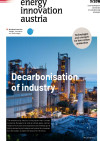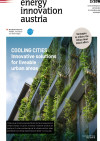Suchergebnisse für "Factsheet: Energietechnologien gestalten, die für alle sinnvoll und nutzbar sind"
Decarbonisation of industry

Ways to achieve a zero-emission industry. Innovation is the key for climate-friendly production.
energy innovation austria
3/2019
Herausgeber: BMVIT und Klima- und Energiefonds
Englisch, 12 Seiten
Downloads zur Publikation
Cooling Citites

Innovative solutions for liveable urban areas
energy innovation austria
2/2019
Herausgeber: BMVIT und Klima- und Energiefonds
Englisch, 12 Seiten
Downloads zur Publikation
ZERMET - Zero Emission Retrofitting For Existing Textile Plants
Minimisation of the consumption of water, chemicals and energy in the textile industry. Further development of the ZERMEG approach in the form of a questionnaire and application in the textile industry.
RCC – Reduced Carbon Concrete: Implementation of CO2-redudes concrete in construction sites
The objectives of the present project "RCC - Reduced Carbon Concrete" were to test the current knowledge about the temperature-dependent curing processes of performance concretes by concrete work on large components on the construction site, under summer and winter conditions, and in precast production. The results will be incorporated into construction practice and standardization work.
SmartCity Baumgarten - Demonstration of an anergy network and implementation of climate-friendly solutions in existing districts
Implementation of a cross-property anergy network for the supply of heating, cooling and electricity in an existing neighbourhood. With this demonstration project, a technical-legal alternative for areas outside of district heating supply is developed, which makes it possible for neighbourhoods to join together to use renewable energies in common.
IEA Bioenergy Task "Biomass Combustion and Co-firing"
Obtaining, preparation and circulation of information about international evolutions in the biomass combustion field and -co combustion, collaboration at and management of task emphases
GREeNvaluation - Real-time monitoring and performance evaluation
The aim of the project was the development of the GREeNvaluation toolkit, as a precursor to the implementation of green and liveable cities. The visualization and accounting (cost / benefit) of green infrastructure services makes the benefits more tangible and understandable. The GREeNvaluation toolkit aims to create awareness far beyond the target areas by means of target group-specific communication formats.
GREENsChOOLENERGY - Development and practical implementation of sustainable solutions for urban hotspots in combination with greening / PV / water
Use of the synergetic effects in the construction of photovoltaic, greening and irrigation systems at the location of HTL1 Klagenfurt Lastenstraße, to optimize the yield of experimental photovoltaic elements and at the same time reduce urban heat islands.
Living and Working in the Moosburg, the "community of education"
The design aims not only at creating comfortable living spaces and practical work environments, but at connecting these realms, thus providing a holistically attractive “living space”. A pilot project will be built on an appropriate site in the very core of Moosburg, neighbouring both the village square and the educational campus.
Gründerzeit with future - demonstration project 1: David´s Corner
High value energy efficient refurbishment of an ensemble of three neighbouring Wilhelminian style buildings in a non-lucrative location.
CombiSol: solar combisystems for houses, state-of-the-art and potentials for improvements
Evaluation of the quality and efficiency of state-of-the-art installed solar combisystems, potentials for improvements and measures to increase the quality
IEA Bioenergy Task 33: Gasification of Biomass and Waste (Working Period 2019 - 2021)
The main aim of IEA Bioenergy Task 33 is the international as well as national information exchange and networking on thermochemical gasification of biomass and waste. The focus is on exchange of information regarding R&D programmes in area of biomass and waste materials gasification, commercial facilities and the marketing chance for gasification facilities to identify and avoid technical and non-technical hurdles.
IEA FBC Implementing Agreement Fluidized Bed Conversion (working period 2009 - 2013)
Overview of the current status of the fluidized bed technology worldwide in regards to energy technology.
IEA PVPS Task 12: Photovoltaics (PV) Sustainability Activities (working period 2024 - 2027)
Photovoltaics (PV) is a renewable energy source that is an important technology for the energy transition. For this reason, or rather despite this, it is important to consider sustainability aspects in PV as well. End-of-life solutions in particular play an important role, as a strong increase in the number of end-of-life modules is expected in the coming years. Well-functioning recycling methods, repair possibilities or reuse options are of great importance. In this project, these existing methods and capacities in Austria are being researched and published in reports and workshops.
Workshop: CO2 Capture and Sequestration (CCS) in Future International R & D Programmes
17. Nov 2004
WKO - Wirtschaftskammer Österreich, Rudolf Sallinger SaalVienna, AT
Initiation of a discussion process concerning the role of CCS in future RTD programmes in general and the presentation of realised (and/or planned) projects in particular as well as challenges of the deployment of CCS technologies.
Innovative system for decentralized CHP on basis of biomass gasification with process optimized production of a low-tar producer gas
Tar loads in the producer gas of CHP-plants based on biomass gasification are reduced by primary measures (staged gasification), whereby the possibilities for application are increased.
Gas cleaning for low tar producer gases from staged biomass gasification
Investigation on gas cooling, on heat management in staged gasification systems, and on gas cleaning from inorganic pollutants, like ammonia and aerosols, of the low-tar producer gas in decentralized staged biomass gasification.
Vilipa - Visible light based Person and Group Detection in existing buildings
Evaluation of the technical and economic feasibility of an occupancy detection system based on the technology of visible light sensing, which, in combination with the building management system, should reduce the energy consumption of buildings. The goal is to implement low-tech/low-complexity solutions that can distinguish between individuals and groups based solely on the detection of visible light reflections.
Best-of "Building of Tomorrow" 2010
22. and 23. November 2010
Skylounge, Austrian Chamber of Commerce (WKO)
Vienna, AT
In the frame of this conference results and ongoing activities of the research programme "Building of Tomorrow" are going to be presented.
Development of modular parts for clay-passive houses

Development of extensive storey-high modular parts made of renewable primary products (wood, straw, hemp) for clay-passive houses.
